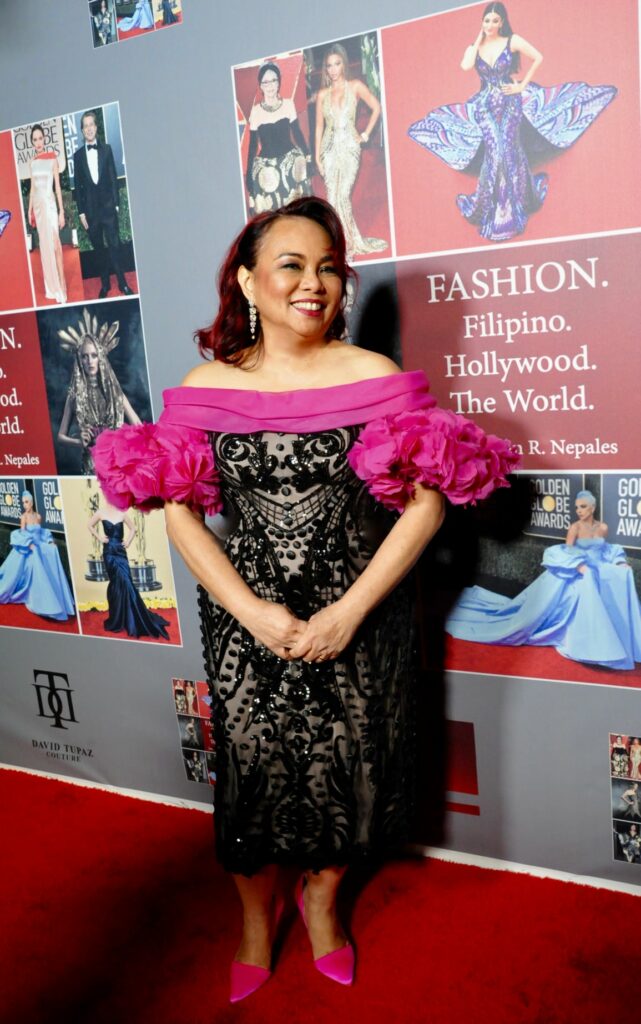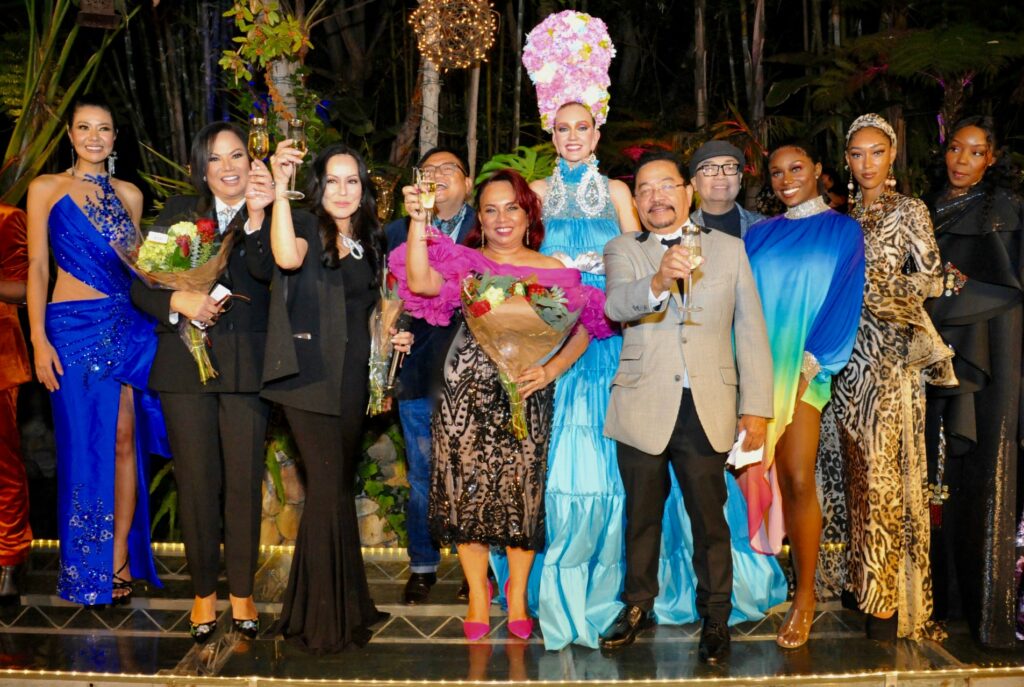Award-winning journalist Janet Susan R. Nepales is the first Filipina member of the Hollywood Foreign Press Association (HFPA) which votes on and presents the annual Golden Globe Awards. She was an executive co-producer of the Golden Globe Awards show (75th to 78th editions).
Born and raised in Quezon City, Philippines, Janet has a weekly column, “Hollywood Insider,” on GMA-7 News Online and is the Hollywood correspondent of the top TV network.
The journalist’s first hardbound coffee table book, FASHION. Filipino. Hollywood. The World, launched in December 2021, showcases the work of top Filipino designers and their impact on the world’s red carpet style, from Hollywood to the most prestigious film festivals. Published by former supermodel Bessie Badilla, it features some of Nepales’ interviews with top Hollywood stars on and off the red carpet.
Paul Quinn: Janet, congratulations on the release of your book. I haven’t seen it, but judging from some of the promo videos it looks beautiful.
Janet Nepales: I’ve always dreamed of putting out a coffee table book about Filipino designers. I’m a Hollywood writer who is very passionate about fashion. Each time I’m on the red carpet, I want to highlight the talent and artistry of Filipino fashion designers, so I wear their gowns. And many celebrities ask me who I’m wearing before I can ask them who they are wearing.

Paul Quinn: What was the Big Ask that put the book in motion?
Janet Nepales: I had to ask all my fashion designer friends as well as some I didn’t know personally, to answer my interview questions for the book. There were some that I couldn’t believe answered my questions.
Josie Natori, for one, is a legend in the Filipino community. She was at the top of my list and she said yes. I was able to gather all these fashion designers from the Philippines to New York, Chicago, and Los Angeles. And they graciously cooperated. I also asked big names in fashion from Dubai, designers like Michael Cinco, Furne Amato and Ezra Santos. They wonderfully collaborated with me.
I interviewed Rocky Gathercole but before my book was published, he passed away. Rocky was a big designer name among Hollywood stars. Beyonce, Lady Gaga, Nicki Minaj, Mariah Carey and JLO have all worn him. He’s in my book so it’s like a tribute to him as well. I think I was the last journalist he talked to before he passed away.
I had to gather all their photos, make a lot of Zoom calls and interviews, and a lot of back and forth emails. But I finished the book in four months during the pandemic so I call it my Pandemic Baby!
Paul Quinn: And those asks obviously paid off in the form of your book. Did other Big Asks follow those?
Janet Nepales: Yes. After completing the book, the next challenge was how to bring it out into the world. I mentioned it to a friend of mine, Lisa Manibog Lew, an Emmy Award-winning producer. I said I’m ready to launch my book here in LA – any ideas on how I can do it? And she said, “Why don’t you have it in my house?”
Lisa’s house is the former home of Slash from Guns ‘n Roses, a beautiful sprawling residence in the hills above Sunset Boulevard. She also contacted fashion designer David Tupaz, a creative genius and designer who is also featured in my book.
David suggested we bring in all the designers, put a runway in the house, and each designer will showcase a few designs in a mini-fashion show.
Lisa even came up with the idea of putting mannequins, wearing the fashions of the featured designers, on the roof of her house for the launch party. Inside the house and out in the garden, mannequins wore the gowns, suits and dresses of the designers.
Paul Quinn: So, when you asked for ideas, is it fair to say you weren’t expecting this kind of response?
Janet Nepales: No, I wasn’t. I was like, can I really do this? But I asked. And this is the magic of what you’re talking about, ASKING. I asked, and for the first time in the history of Filipino fashion design, all these fashion designers gathered in one place, LA, with their gowns and models for the runway which was built on top of the pool of Lisa’s house.
The designers even donated stuff for the swag bags, from jewelry, masks to calendars as well as items to be raffled off like jackets and dresses. They all went out of their way. It was a community effort. When you ask people whom you trust and you think could help you, just ask and give it a shot.
Paul Quinn: And in your case, you asked people who truly “think big.” The connection between asking and receiving sounds so simple and obvious, doesn’t it — and yet most people I talk to can’t recall any Big Asks in their lives. What’s your advice for people who are reluctant to ask?

Janet Nepales: By asking, you experience a richer life. There’s no harm in asking. It’s free. You can always ask, whether it’s for your knowledge, enlightenment, or empowerment. You’ll feel better if you ask rather than keep it bottled up. Asking gives you more confidence and opens doors for you.
Paul Quinn: Would the younger Janet recognize the Janet you are today? Did she ask for what she wanted?
Janet Nepales: Yes. I made things happen for myself. When I was in college, I was already sending my resumes to all the newspapers and magazines. At 19, I asked an editor to be part of his magazine, MOD magazine, and I got my own column. When the editor moved to the Times Journal Publications, he took me with him as his editorial assistant for the Sunday magazine, Parade.
I also became a staff writer in Parade and all the other publications of Times Journal like People’s Journal, Architectural Journal and Chinatown East, among others. As a writer for Parade magazine, I interviewed the Hollywood stars who came to the Philippines. And my Hollywood connection grew from there when I immigrated to the U.S.
Paul Quinn: How did your family view your career choice?
Janet Nepales: Right now, my dad is very happy where I am and I’m very secure with my career.
But in the beginning, he never wanted me to become a journalist (laughs). He said there’s no money in journalism. But I believe that if you are good at what you do, money will follow. He didn’t like newspapermen and said there are many dirty old men in journalism.
And I told him, you raised me and you have to trust who you raised. I am your daughter and I can handle anybody and take care of myself. Plus, I told him that in any industry, there are dirty old men.
Paul Quinn: It sounds like he was very protective of you.
Janet Nepales: He was very strict and protective of me because I’m the eldest in the family. He thought that if I made a mistake, it would have a ripple effect on all my siblings: I had to graduate valedictorian or my other siblings wouldn’t graduate valedictorian. I did graduate valedictorian and all my siblings graduated with the same honor.
So, I was trying to be the perfect child for him. I was always following the rules because I felt that all my siblings would be a failure if I was a failure. So that was a lot of pressure on me. But then one of my younger siblings got married early and eloped, so I said, “Dad, you’ve been watching the wrong kid!” (laughs)
Paul Quinn: I recently interviewed Jim Lew, a man whose parents were Chinese immigrants, and he said that Chinese culture generally discouraged asking regardless of gender. And I spoke with Adele Nandan, a woman whose parents are from India, who talked about how Indian women are reluctant to ask for what they want because they’re taught to focus instead on others’ needs, particularly men. What’s the attitude in the Philippines?

Janet Nepales: The Filipinas are very strong and independent. They can survive without the men. Most of the women in the Philippines work and raise kids. It’s a matriarchal society. People listen to their mothers and respect them.
We had two female presidents and we’re very proud of that. Corazon Aquino led the country during the revolt in the Philippines against Ferdinand Marcos’ administration and she did it peacefully. No violence. I think that’s the power of women.
I also became confident because I had strong women surrounding me. Most of the women in my family were teachers. And being a teacher in the Philippines was, like, major. The US gets teachers from the Philippines because they’re very caring, patient, organized and dedicated to their work. And most of the nurses in the US are also from the Philippines.
Paul Quinn: There’s a section in my book, The Big Ask, about questions that reveal bias, particularly toward minorities. As a Filipina, how have you experienced bias, whether through someone’s questions or behavior?
Janet Nepales: When I immigrated to the U.S. nobody wanted to give me local work experience. I was applying for a secretarial job and passed all the tests and interviews. And then the lady who was interviewing me said, “You passed everything but you’re not a graduate of USC or UCLA; we don’t know your school.”
And I told her, “Excuse me, the University of Santo Tomas is the oldest university in the Philippines and it is even older than Harvard and I graduated at the top of my class.” On the way home, on the bus, I was sobbing and wondering if I made a mistake coming here where people are discriminating against me.
By the way, the job I was turned down for was a popular hotel chain. And guess what? We became a client of that hotel – so now, they are serving me!
Paul Quinn: Success is the best revenge!
Janet Nepales: Another time, I was working in a magazine, editing a white person’s writing job. And she didn’t like an immigrant, a foreigner, a person of color, a Filipina, editing her work. She was, like, Who are you to edit my work?
And she didn’t like the red marks on her page so she went to our boss and said, “Look at this! English isn’t even her first language, etc.” And the editor said, “Let Janet edit your work. If you don’t like the work, you can get out.” She quit. I stayed in my job.
Paul Quinn: How are things changing for Filipinos in Hollywood?
Janet Nepales: We are fighting for our presence, our rights. And more Asians are being accepted in Hollywood. Hopefully, more doors are being opened. I’ve interviewed a lot of Filipinas who are behind and before the cameras. And they’re very hopeful that more AAPI [Asian American Pacific Islander] talents will be accepted in the industry.
Paul Quinn: Many people are afraid to ask because they’re afraid of the possibility of rejection. As a journalist, how do you handle rejection?
Janet Nepales: I can take rejection because I know it’s part of life. It’s part of being a journalist so for me, there’s no pain. A lot of people open up to me but I’ve had people who also say no to being interviewed.
Sometimes it’s because of where they are in their lives that they don’t want to talk so you give them some space. You can ask again and they may be in a better place, and it will happen.
Paul Quinn: Do you find yourself asking people about themselves even when you’re not doing interviews?
Janet Nepales: Yes, because I’m curious. I meet somebody and ask questions and follow-up questions all the time. And it’s not like I’m nosy. I’m curious. I think some people are scared that if they ask personal questions, the person will think they’re nosy. But the person always has the right to say they don’t want to discuss it, or not right now.
Paul Quinn: A part of personal and professional development that a lot of people overlook is asking for feedback. What is your advice on asking for feedback?
Janet Nepales: Some people are scared to say the truth so you have to trust somebody who will tell you the truth and not give you PR answers. For me, it’s my husband, Ruben. Since we’re both writers, authors and journalists, we take each other’s comments seriously.
But generally speaking, if it’s constructive criticism, then I try to improve myself. Even in high school, people would say, “How can you be an editor when you don’t even know how to type?” So, I taught myself to type. And during that time, it was only typewriters, no computers. Don’t take it personally, take it as a challenge. But you have to ask someone you trust and respect.
Paul Quinn: Given everything that you’ve learned and achieved, Janet, what advice do you have for young people who are looking to make a place for themselves?
Janet Nepales: I do a lot of talks to kids, teenagers, and young adults and I tell them, follow your heart. Most Filipino parents would like their children to be doctors, accountants, nurses, or lawyers. And I’ve seen a lot of Filipino actors and fashion designers who took up economics, architecture or engineering in college just to please their parents.
I know these people’s stories. But they always went back to their first love. So, I tell young people, don’t waste your time doing what you don’t want to do. Follow your heart. Because it’s your life, not your parents’.
Paul Quinn: What’s the question they ask you most after these talks?
Janet Nepales: How to get into journalism. And I always tell them, start now. Don’t wait until you graduate. Get yourself known. Follow or shadow an editor. Or do an internship in a company that you want to be part of. Learn the trade and keep on working. If you’re not getting published, do a blog.
Paul Quinn: Except for blogging, Janet, you’ve just described your own career strategy, which has worked out very well for you. As you said earlier, you’ve made things happen for yourself.
Janet Nepales: And it’s happened because I followed my passion for writing and journalism. I immigrated to the US and joined the Hollywood Foreign Press Association. I am a former officer and board member working and voting at the Golden Globes. As a member, I’ve attended and covered a lot of film festivals everywhere – Cannes, Venice, Australia, Toronto, Shanghai, New York and Sundance, among others. It’s a blessing. I’m very happy to be where I am.

Visit Janet Susan R. Nepales on Facebook. Paperback edition of her book now available on Amazon.
Paul Quinn is author of The Big Ask, a nearly completed book about asking as a life skill, which features portions of this content. He invites readers of this blog to contribute ideas, research, stories, or thoughts on asking. As founder of See The Potential LLC, he helps leaders and influencers across many industries create and confidently deliver compelling presentations that result in wins for all stakeholders.

Now she has another Fan! Thanks Paul